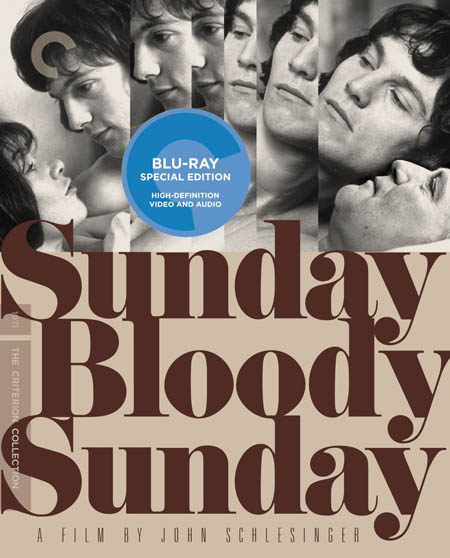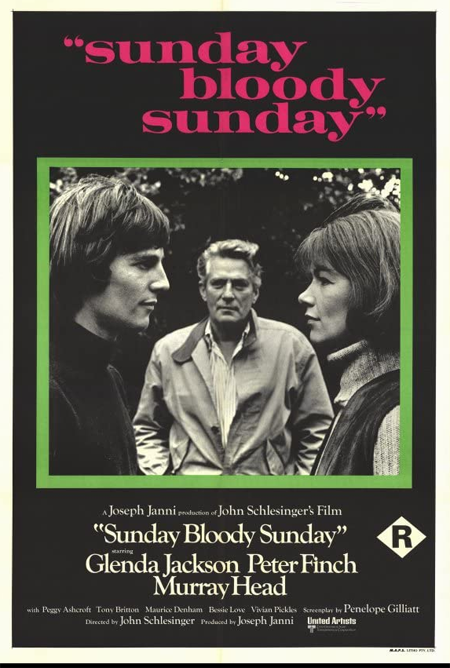
RETRO-ACTIVE: THE BEST FROM THE CINEMA RETRO ARCHIVES
By Lee Pfeiffer
You don't have to be gay to admire John Schlesinger's 1971 film Sunday Bloody Sunday but it probably helps in terms of appreciating just how ground-breaking the movie was in its day. As a straight guy of high school age when the film was released, I do remember it causing a sensation, although it would literally take me many years before I finally caught up with the film. Gay friends always spoke reverently of the movie and expressed how the most refreshing aspect of the story was how normally a loving relationship between two adult men was portrayed. In viewing the film as a Criterion Blu-ray release, I feel I can finally appreciate that point of view. Gay men have long been portrayed in movies, of course, but for the most part they had been depicted as objects of ridicule or as sexual deviants. There were the odd attempts to present gay characters as sympathetic in films such as The Trials of Oscar Wilde and the brilliant Victim. Yet, even these fine efforts present homosexuality as a burden those "afflicted" must bear. Stanley Donen's 169 film Staircase offered fascinating and bold performances by Rex Harrison and Richard Burton as two aging queens. However, the studio marketing campaign over-emphasized the oddity of two of the film industry's great lady's men playing a gay couple. In fact, the ad campaign showed Burton and "Sexy Rexy" giddily dancing, thus falsely conveying that the film was a comedic romp instead of a poignant and intelligent look at loving homosexual relationship. Schlesinger, one of the first unapologetic directors to come out of the closet (if, indeed, he was ever in one), decided that the most daring aspect of this highly personal film would be in its very ordinariness. The story covers a complicated love triangle between three disparate people. Dr. Daniel Hirsh (Peter Finch) is a middle-aged, Jewish London doctor who is involved romantically with a much younger man, Bob Elkin (Murray Head). Hirsh doesn't flaunt his homosexuality, nor does he attempt to painstakingly deny it. He just lives his life as a respected member of his community, although it is clear his family thinks he's straight. (In one amusing, though uncomfortable sequence, Hirsh attends a Bar Mitzvah and has to endure attempts by nosy female relatives to set him up with his "dream girl"). The relationship between Hirsh and Bob is fairly intense, but is compromised by one uncomfortable fact: Bob is bi-sexual and is carrying on an equally intense love affair with an older woman, Alex Greville (Glenda Jackson). Both Hirsh and Alex know about each other and (barely) tolerate the triangle as the price of having Bob in their lives. For his part, Bob is a rather self-absorbed young man who seems to have genuine affection for both of his lovers, but is also either oblivious or uncaring about how the uncertainties of the relationship are affecting their psychological well-being.
Sunday Bloody Sunday was released a time when the gay rights movement was moving into high gear in the post-Stonewall period. It illustrates why the 1970s is regarded by many as the most liberating decade in film history, with old line directors like Hawks, Welles and Hitchcock working at the same time young turks like Schlesinger were shaking things up in a way the old masters never had the opportunity to do, thanks to the restrictive motion picture code. Sunday is primarily remembered for an eyebrow-raising scene in which Hirsh and Bob engage in a romantic kiss. There's nothing sensational about the tasteful way in which this rather routine gesture between lovers is presented on screen. In fact, it was the sheer lack of sensationalism that drove home Schlesinger's primary message: that loving gestures between gay men can be every bit as routine as they are between husband and wife. The fact that the kiss was enacted by two straight actors did add considerable gravitas to the moment and must have caused more than one straight viewer to think "Well, if they don't care about enacting such a scene, why should I feel uncomfortable watching it?" Schlesinger also dared to film tasteful but passionate bedroom scenes between Bob and Hirsh. Nevertheless, nothing much actually happens in Sunday Bloody Sunday. The story was based in part on real-life experiences and people from Schlesinger's own life. The story merely traces the ups and downs in the love triangle as Bob causes panic in both Hirsh and Alex by announcing he is thinking of moving to America. Hirsh and Alex do have an unexpected face-to-face meeting during this crisis and their sheer civility and inability to engage in more than light banter only adds to the dramatic tension.

The primary attribute of the film, aside from Schlesinger's spot-on direction, is the brilliance of the performances. Glenda Jackson was then emerging as a national treasure for the British film industry and the little-known Murray Head acquits himself very well indeed. However, it is Peter Finch's performance that dominates the movie as we watch his character go from loving acceptance of Bob's youthful self-absorbing actions to downright fury as his realization that Bob will never have the same passion for him. It's a superb performance on every level. Some viewers find the film's bizarre final sequence in which Hirsh addresses the viewer directly about his philosophy of life, but I found it to be a distraction and somewhat confusing. Nevertheless, this is a fine film, worthy of the praise it has generated over the years, and one that remains remarkably timely today.
The Criterion Blu-ray is right up to the company's top-notch standards. The transfer is beautiful and there are the usual informative extras including:
- New interviews with Murray Head (who says that, as a young actor, he found his character to be rather despicable), cinematographer Billy Williams (who supervised the Blu-ray transfer), production designer Luciana Arrighi, Schlesinger biographer William J. Mann and the director's long-time partner, photographer Michael Childers who shot many of the great production stills for the film.
- A 1975 audio interview with Schlesinger
- Screenwriter Penelope Gillatt's original introduction to the published screenplay (there is plenty of coverage throughout the Blu-ray concerning the tense working relationship between Gillatt and Schlesinger, who accused the writer of taking the lion's share of credit for a screenplay he had extensively rewritten.)
- The original theatrical trailer
- Extensive liner notes by writer Ian Buruma, Schlesinger's nephew who appeared as an extra in the film.
In all, an outstanding tribute to an outstanding work by one of the era's great filmmakers.
Click here to order from Amazon. The film is also currently streaming on the Screenpix app, available for $2.99 a month through Amazon Prime, Roku and Apple TV.